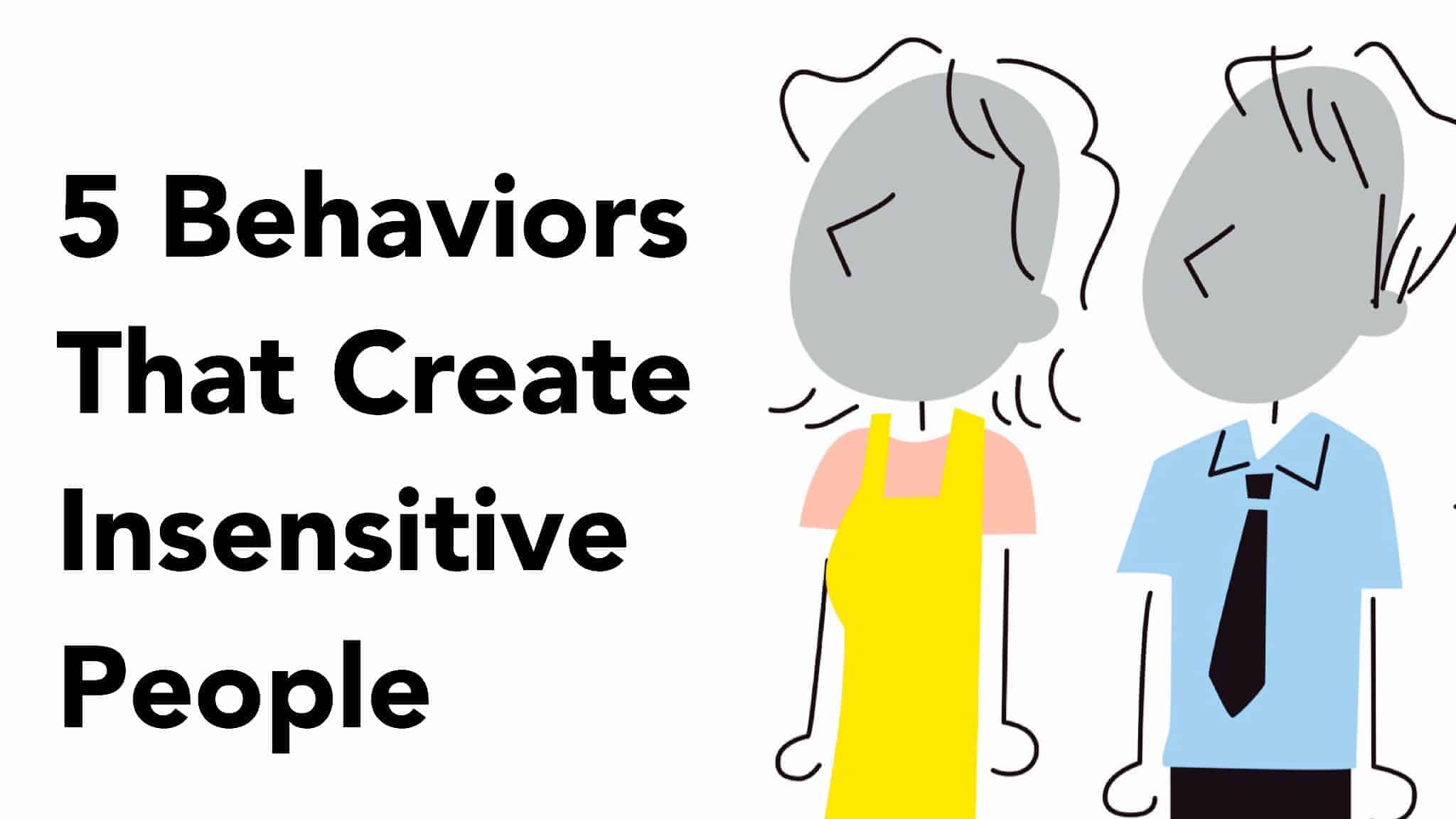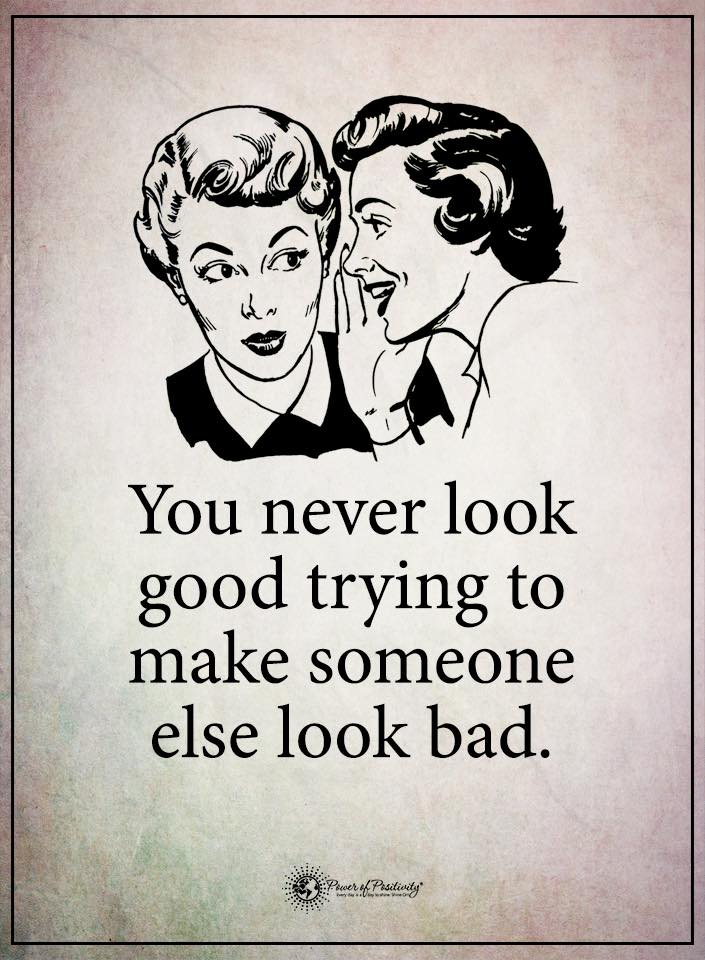When we look at the world as a whole, most of us will concede that kindness and acceptance are more commonly practiced than cruelty and meanness. This outlook is often strongly challenged by our inevitable run-ins with the latter group. Some people are unapologetically insensitive to their fellow human beings. Such individuals lack the empathy and tactfulness that so many of us come to expect. In short, we – at the very least – anticipate common courtesy and basic decency from those we come in contact with.
Although a minority, those who do not heed these standard social practices pose a risk of spreading their pessimistic ways to otherwise good people.
The purpose of this article is not to delve into complex sociological topics. Instead, we wish to provide insight into what makes insensitive people think and act in such a manner.
You’ll surely notice that these five behaviors are pretty commonsensical. Despite this, we’ll often forget what goes on “in the background” of another person’s mind, particularly those who go against the generally accepted social contract of decency and common courtesy.
Here are 5 “in the background” behaviors, attitudes, and circumstances that create insensitive people:
“Just as the performance of the vilest and most wicked deeds requires spirit and talent, so even the greatest demand a certain insensitivity which under other circumstances we would call stupidity.” – Georg C. Lichtenberg, German scientist, philosopher and satirist
1. Brain Chemistry
Brain chemistry is the first topic of discussion – and for a good reason. This is almost assuredly the primary driver of callous behavior.
As we are all well aware, our brains are different in some cases, such as those who possess narcissistic tendencies. This fact cannot be overlooked.
Insensitive people have very different brain chemistry than most. Specific mechanisms within their brain do not permit the conveying of altruism or sensitivity. Most of the time, insensitive people aren’t aware that their behaviors are perceived as such. Even if someone pulls them aside and attempts to explain their behavior as unacceptable or off-putting, the insensitive person will display a sense of bewilderment. Hence, they’ll probably carry on as usual.
2. Different Thought Patterns
Related to the previous topic, in some ways, thought processes are another main reason insensitive people act the way they do. The main difference is that thought patterns are often a byproduct of environmental factors, while brain chemistry is something that is (often) autonomic.
Take, for example, the corporate world – a fiercely-competitive arena that may manifest into aggressive thought patterns. After a while, these patterns – you guess it – alter one’s brain chemistry.
Likewise, strongly-held personal beliefs and convictions (e.g., religious views, political stances) may cause someone to act or say things perceived as aggressive and insensitive.
3. Insensitive People Are Often Angry
Angry emotions feed irrational thoughts, words and behaviors. When we’re mad, our higher-level executive functions are heavily suppressed. This impact on the brain makes it much more challenging to retain a sense of self-control. Of course, when self-control is absent, the likelihood of doing or saying something insensitive multiplies.
Anger lowers our inhibitions and makes us forget the consequences of our actions. Unfortunately, this includes the pain inflicted on the receiving end of our insensitivities. We can hurt someone deeply – and, many times. They do not deserve such treatment.
4. Lack of Self Esteem
Lack of self-esteem as it relates to insensitivity is relatively simple to understand.
Many (most?) people with self-esteem issues can still constructively interact with others by keeping their concerns in check. However, a small number of individuals will degrade others to “make themselves feel better.” The problem with this is two-fold: (1) it’s a very, very short-term “solution” to a much deeper issue, and (2) pain is inflicted onto someone who, in many instances, did nothing wrong.
5. Stress Causes Insensitive People
How effectively someone deals with stressful situations, whatever they may be, is easily seen by how they interact with others afterward. Do they bark something nasty to someone else? Do they carry on and get things done anyway? Insensitive people fall into the former group.
Saying that we all deal with stress differently is a vast understatement. Some people cannot constructively handle specific stressful triggers. Furthermore, those inept at coping with stress will spread their negative state of mind to others around them.
Simply put, stress is a distraction, and insensitive people are almost incapable of handling the effects of stress without hurting someone in the process.
10 Ways to Be More Sensitive to Others
Studies show that social relationships help reduce stress and lower your chances of heart problems. Part of building solid relationships is learning how to relate to other people. One crucial social skill everyone should know is how to be more sensitive to others. Here are some suggestions to be more sensitive to those around you.
1. Be a better listener
One way to be more sensitive to others is to be a better listener. It’s easy to get distracted when someone talks to you. Giving the person your complete attention shows them you care about them. Other things you can do to become a better listener include
- Don’t look at your phone
- Don’t interrupt them
- Make eye contact with the person speaking
- When they finish speaking, ask questions to clarify
- Reword what you think you heard
2. Show interest
When someone tells you they’re having a hard time, be sure to show concern. Ask them if there’s anything you can do to help. Showing concern for others, especially when in trouble, shows sensitivity and care.
3. Apologize when it’s necessary
Sensitive people discern when they’ve hurt someone. They’re willing to make amends by apologizing for hurting the person’s feelings. You may say something like
- “I need to apologize for teasing you about your hair. I was trying to be funny, but I realized it wasn’t kind. Please forgive me.”
- “I’m sorry for being late today. I know it caused you some inconvenience.”
4. Show empathy
Empathy means you emotionally identify with them and are sensitive about what they’re going through. You may or may not have experienced what they are experiencing, but you can attempt to see the world through their eyes.
5. Be willing to learn from others
When you’re eager to learn from others, it reveals your humility. You have a healthy view of yourself. A willingness to learn from others means you’re sensitive to what others can teach you. You’re willing to learn from your kids, your spouse, or a co-worker. Insensitive people feel superior to others and miss out on learning from them.
6. Offer support
Another way to be more sensitive to others is to support them. You look for ways to help or encourage them, especially if they’re going through a difficult time. You say things like, “I’m so sorry for your loss. Let me know how I can help you.” or “Congratulations on the job promotion!” Insensitive people have a hard time thinking about anyone besides themselves. They justify their lack of support by pointing to their needs as more important.
7. You remember people’s name
You show sensitivity towards others when you do something as simple as remembering their name. Next time you meet someone, focus on learning their name.
8. Use gracious words
Have you ever talked with someone who attacked you with their language and then said something like, “I’m just being honest?” They weren’t being honest. They were rude and insensitive. Sensitive people can tell you the most difficult things in a way that doesn’t destroy or hurt you.
9. Show that you care for others
A sensitive person shows care for others by their words and actions. They’re not absorbed in their thoughts and life. Insensitive people are blinded to the needs of others. They are incapable of seeing others’ needs.
10. Value the opinions of other people
Being sensitive to others means you value their ideas and opinions. Insensitive people are interested in their beliefs. They feel threatened by others’ thoughts because fearing they won’t get what they want.
Final Thoughts on Being Aware of the Behaviors That Cause Insensitive People
The bottom line is we all share the planet. Being sensitive to others with kindness and concern is one simple way you can make the world an inviting place to live.

















 Community
Community

